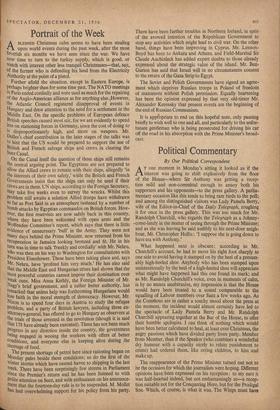Portrait of the Week
ABLESSED Christmas calm seems to have been stealing upon world events during the past week, after the most feverish six months we have seen since the war. We have now time to turn to the turkey supply, which is good. or watch with interest other less tranquil Christmases—that, say. of the farmer who is defending his land from the Electricity Authority at the point of a pistol. Further afield the situation, except in Eastern Europe, is perhaps brighter than for some time past. The NATO meetings in Paris ended cordially and were used as much for the repairing of the Anglo-American alliance as for anything else.1However, the Atlantic Council registered disapproval of events in Hungary and drew attention to the need for a settlement in the Middle East. On the specific problems of European defence British speeches caused most stir, for we are evidently to spend less on stationing forces in Germany, since the cost of doing so is disproportionately high, and more on weapons. Mr. Dulles's chief contribution in the later stages of the talks was to hint that the US would be prepared to support the use of British and French salvage ships and crews in clearing the Suez Canal.
On the Canal itself the question of these ships still remains the central arguing point. The Egyptians are not prepared to allow the Allied crews to remain with their ships, allegedly 'in the interests of their own safety,' while the British and French Governments insist that the ships can only be used if their crews are in them. UN ships. according to the Foreign Secretary, May take five weeks even to survey the wrecks. Whilst this Problem still awaits a solution Allied troops have withdrawn as far as Port Said in an atmosphere tautened by a number of bomb attacks by Egyptian commandos on British forces. How- ever, the first reservists are now safely back in this country, Where they have been welcomed with open arms and the Wolfenden Committee's report, which says that there is little evidence of unnecessary 'bull' in the Army. They were not many days behind the Prime Minister, now returned from his recuperation in Jamaica looking bronzed and tit. He in his turn was in time to talk 'frankly and cordially' with Mr. Nehru, Who was then on his way to Washington for consultations with President Eisenhower. These have been taking place and, says Mr. Nehru, have 'profited him very much.' He has also said that the Middle East and Hungarian crises had shown that the Most powerful countries cannot impose their domination over Weak ones. Miss Anna Kethly. the Foreign Minister of Mr. Nagy's brief government, and a rather better authority, has ,remarked that unless help was forthcoming Hungarians would lose faith in the moral strength of democracy. However, Mr. Nixon is to spend four days in Austria to study the refugee Problem, and a party of British lawyers, including three ex- attorneys-general, has offered to go to Hungary as observers at the trials of those arrested in the revolution (though it is said that 178 have already been executed). There has not been much Progress in any direction inside the country, the government being engaged in wooing the workers with offers of better conditions, and everyone else in keeping alive during the shortage of food. The present shortage of petrol here since rationing began on Monday pales beside these conditions; so do the first of the . winter storms which have caused havoc to shipping in the last week. There have been surprisingly few storms in Parliament since the Premier's return and he has been listened to with Polite attention on Suez, and with enthusiasm on his announce- ment that the fourteen-day rule is to be suspended. M. Mollet has had overwhelming support for his policy from his party. There have been further troubles in Northern Ireland, in spite of the avowed intention of the Republican Government to stop any activities which might lead to civil war. On the other hand, things have been improving in Cyprus. Mr. Lennox- Boyd has been to Ankara and Athens, and Field-Marshal Sir Claude Auchinleck has added expert doubts to those already expressed about the strategic value of the island. Mr. Ben- Gurion has said that Israel will in no circumstances consent to the return of the Gaza Strip to Egypt.
The Soviet and Polish Governments have signed an agree- ment which deprives Russian troops in Poland of freedom of manoeuvre without Polish permission. Equally heartening has been the opinion expressed by that very old-timer Mr. Alexander Kerensky that present events are the beginning of the end of Russian Communism.
It is apprOpriate to end on this hopeful note, only pausing briefly to wish well to one and all, and particularly to the unfor- tunate gentleman who is being prosecuted for driving his car off the road in his absorption with the Prime Minister's broad- cast.


































 Previous page
Previous page